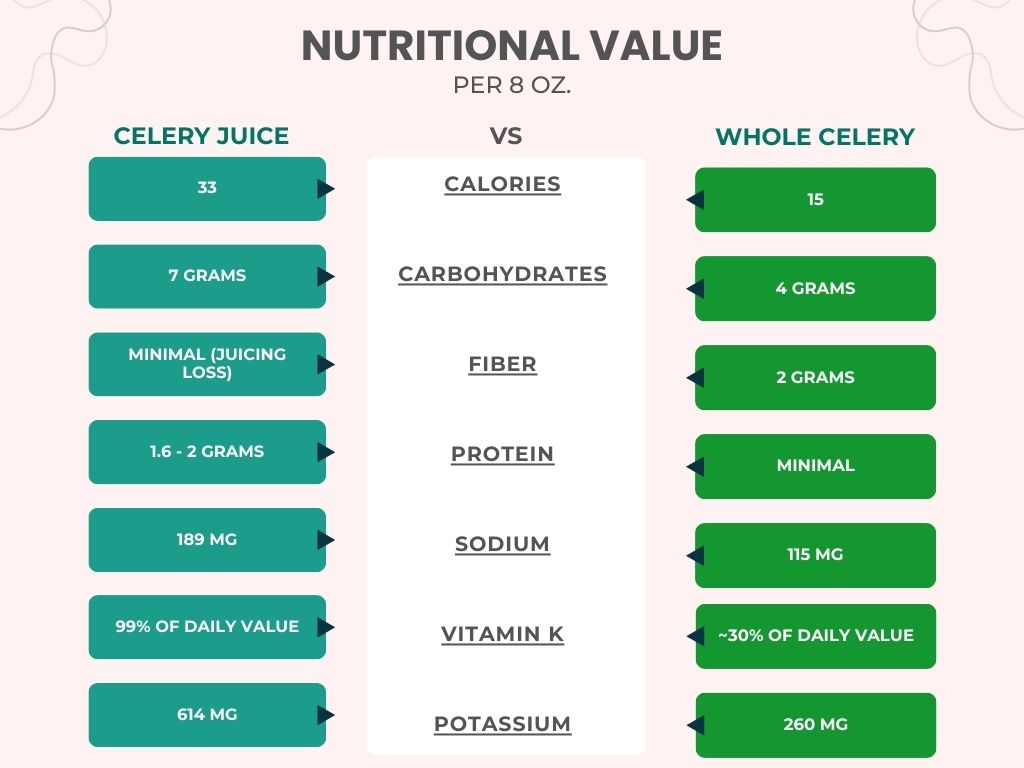You’ve probably noticed celery juice popping up everywhere—whether it’s splashed across Instagram, hyped on wellness blogs, or featured in celebrity morning routines.
While some promote it as a cure-all drink, promising better digestion and even glowing skin, the truth behind these claims isn’t as flawless as it seems. But with so much hype, it’s natural to wonder—is celery juice actually healthy, or just another fleeting wellness trend?
In this article, we’ll dive into the real science behind celery juice. You’ll discover not only its potential benefits but also the myths that could steer you wrong.
Whether you’re curious about its ability to boost hydration, manage blood pressure, or simply want to know if it’s worth adding to your morning routine, we’ve got you covered.
Let’s sort the facts from the fads and help you make an informed choice for your health.
What Are the Real Health Benefits of Celery Juice?
Celery juice isn’t just another fad; it packs some serious nutrition in every sip. This humble green juice is loaded with vitamin K, C, and folate, plus it offers potassium and antioxidants that help keep your body in tip-top shape.
Whether you’re looking to boost your heart health, fight off inflammation, or just stay hydrated, there’s a lot to love about this trendy drink.
But before you throw out your blender for a juicer, let’s take a closer look at what’s really going on.
 Hydration on Point
Hydration on Point
Celery juice is 95% water, which makes it an easy and delicious way to stay hydrated all day long.
Staying hydrated isn’t just about quenching your thirst; it also helps regulate body temperature and digestion.
A glass of celery juice in the morning might just be your new best friend!
 Anti-Inflammatory Powerhouse
Anti-Inflammatory Powerhouse
Inflammation is linked to all kinds of health issues—from arthritis to heart disease. It is full of antioxidants like luteolin and apiin that help cool down that inflammation, acting like a soothing balm for your cells.
While research is still growing, early studies suggest it could be a great addition to your anti-inflammatory toolkit.
 Supports Heart Health
Supports Heart Health
With a solid dose of potassium, celery juice helps manage blood pressure by relaxing the walls of your arteries.
Some studies even suggest it can improve cholesterol levels and reduce your risk of heart disease. Think of it as a simple way to show your heart some love—without all the heavy lifting.
 Digestive Help Without the Bulk
Digestive Help Without the Bulk
Though celery juice won’t give you the fiber benefits of eating whole celery, it might help stimulate stomach acid and support digestion.
Plus, it’s light and hydrating, making it easier to drink first thing in the morning when your digestive system is gearing up. Just remember: fiber is your friend, so don’t ditch whole veggies entirely!
 Watch Out for the Sodium
Watch Out for the Sodium
One thing to keep in mind: celery juice can sneak in more sodium than you might expect, which isn’t ideal if you’re keeping an eye on your salt intake.
It’s always smart to enjoy it in moderation—because too much of a good thing can still tip the scales the wrong way.
Nutritional Profile of Celery Juice
Celery juice is a nutrient-packed, low-calorie beverage with a unique profile of vitamins and minerals.
However, it differs significantly from whole celery, especially when it comes to fiber content and nutrient concentration.
Nutritional Value (Per 8 oz.)

So, Is Celery Juice Actually Good for You?
Celery juice can be a refreshing and nutritionally rich addition to your routine, but it’s not a cure-all. Use it to complement a balanced diet, not replace whole foods.
And while it can give you a hydration boost and provide some helpful nutrients, keep an eye on your fiber intake and sodium levels.
A glass here and there ? Absolutely.  Just don’t fall for the detox hype!
Just don’t fall for the detox hype!
Pros
- Rich in vitamins which support immunity, bone strength, and overall health
- Vitamins A, C, and K
- Folate
- Potassium
- Calcium
- Magnesium
- Antioxidants like flavonoids and phytonutrients
- A light beverage that can keep you refreshed without weighing you down with extra calories
- With 95% water, it’s a great way to stay hydrated, which supports digestion and circulation
- Contains antioxidants like luteolin and apiin, which may help cool down inflammation and protect against chronic diseases
- The potassium content can help lower blood pressure and promote better heart function
Cons
- One significant downside of juicing celery is the loss of dietary fiber. Whole celery provides fiber that aids in digestion and helps maintain a healthy gut
- The juicing process can lead to the loss of some nutrients found in whole celery. While the juice retains many bioactive compounds, it lacks the full nutritional profile of the whole vegetable
Celery Juice Myths Debunked: What Science Says
Despite the fact that celery juice has become a wellness craze, many of the health claims made about it are unsubstantiated.
Below, we’ll debunk three of the most popular myths about celery juice to help you separate fact from fiction.
 Celery Juice Clears Up Skin Issues
Celery Juice Clears Up Skin Issues
The idea that celery juice transforms your skin is mostly anecdotal. While it contains antioxidants and vitamins beneficial for general skin health, no studies directly link celery juice to improved skin. In fact, celery contains compounds like furocoumarins, which can increase sensitivity to sunlight, posing a potential skin risk. Celery Juice Promotes Weight Loss
Celery Juice Promotes Weight Loss
Though celery is low in calories and can help with hydration, there’s no solid scientific evidence that it directly causes weight loss. The fullness some people feel from drinking it is mostly due to water content, not fat-burning properties. Claims about it altering gut microbiota for weight loss are preliminary and based on animal studies—not humans. Celery Juice Prevents Digestive Disorders
Celery Juice Prevents Digestive Disorders
Juicing celery removes most of its fiber, which plays a key role in promoting digestive health. While people may feel better when they incorporate more natural foods (including celery) into their diet, there’s no robust evidence that celery juice alone prevents digestive disorders like GERD or IBS.
Potential Risks of Celery Juice
Celery juice, while popular for its potential health benefits, poses certain risks, particularly in relation to medication interactions and specific health conditions. Here are some key considerations:
Interaction with Medications
- Celery juice can lower blood pressure, which may enhance the effects of antihypertensive medications, potentially causing blood pressure to drop too low.
- Celery contains compounds that may thin the blood, increasing the risk of bleeding when taken with anticoagulant or antiplatelet drugs such as warfarin and aspirin.
- Celery may interfere with thyroid function and affect medications like levothyroxine, potentially reducing their efficacy.
- Celery might affect how the body processes lithium, leading to increased levels and potential toxicity.
- Celery can stop CYP-450 enzymes from working, which can change how medicines like venlafaxine are broken down.
- Consuming celery juice can prolong the effects of acetaminophen, potentially increasing its side effects.
Who Should Avoid Celery Juice?
- Pregnant Women: Celery seed is contraindicated during pregnancy due to its potential uteroonic effects.
- Individuals with Bleeding Disorders: Those with bleeding disorders should avoid celery juice due to its blood-thinning properties.
- People with Thyroid Conditions: Individuals with thyroid issues should be cautious as celery might interfere with thyroid function.
- Allergy-Prone Individuals: People allergic to birch pollen or other related plants may also be allergic to celery and should avoid it.
- Individuals on Specific Medications: Anyone taking medications that interact with celery (as listed above) should consult a healthcare provider before consuming celery juice.
Is Celery Juice Really Worth the Hype?
Celery juice may not be the miracle drink that some claim, but it definitely holds its own with a wealth of hydration, nutrients, and antioxidants.
Whether you’re looking to add a healthy twist to your mornings or sneak in more potassium and vitamin K, it can be a refreshing part of a balanced lifestyle.
However, like anything in life, moderation is key. While celery juice can boost your health in some ways, it’s not a cure-all—and certainly no replacement for whole veggies.
If you’re on medications or sensitive to the sun, a quick chat with your doctor will ensure that your celery adventures remain safe and enjoyable.
So go ahead—enjoy a glass, get that nutrient kick, but keep things balanced. Because when it comes to health, a little green can go a long way  , but it’s not the only color in the rainbow.
, but it’s not the only color in the rainbow.
Cheers to feeling good, staying hydrated, and finding joy in the simple things—like sipping smart!
The post Celery Juice: Is It Really Healthy? appeared first on Power of Positivity: Positive Thinking & Attitude.




 Hydration on Point
Hydration on Point Anti-Inflammatory Powerhouse
Anti-Inflammatory Powerhouse Supports Heart Health
Supports Heart Health Digestive Help Without the Bulk
Digestive Help Without the Bulk Watch Out for the Sodium
Watch Out for the Sodium Celery Juice Clears Up Skin Issues
Celery Juice Clears Up Skin Issues
